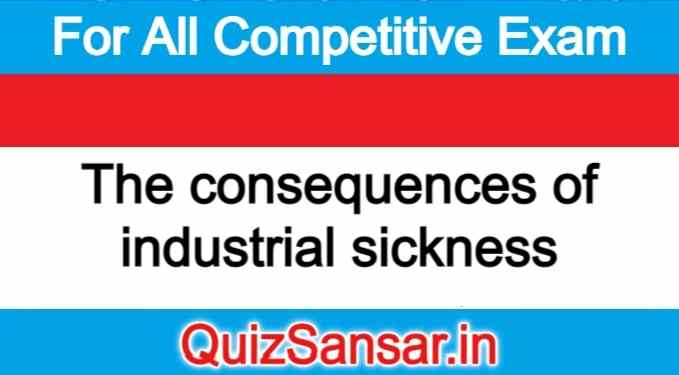
The consequences of industrial sickness
Consequences of Industrial Sickness:
Industrial sickness has been resulting in serious consequences in an under-developed labour-surplus economy like India.
These consequences of industrial sickness include: (a) Aggravating unemployment problem through the closure of industrial units;
(b) Widespread labour unrest due to closure, threatening industrial environment of the country;
(c) Wastage of huge resources invested in these sick units; (d) Creating disincentive among the entrepreneurs and investors due to widespread closure of units;
(e) Creating adverse impact on the other related units through backward and forward linkages;
(f) causing huge financial losses to banks and other term lending institutions and locking up huge funds into these sick industrial units; and
(g) Resulting huge loss of revenue to both Centre, State and Local governments. Remedial Measures to Deal with the Problem of Sickness Industrial sickness is a serious problem faced by the country at present. This has affected the health of industries working under both public and private sector. Thus in the meantime various incentives, conclusions, doles etc. have been offered to these sick units for their revivals. These measures for revival and rehabilitation are discussed below.
1. Measures Taken by Banks:
In order to revive and rehabilitate the sick industrial units, the Commercial banks granted various concessions of these units which ncludes:
(a) Granting additional working capital;
(b) Recovering proper moratorium on payment of interest and (c) Freezing a part of the understanding in the accounts of these units.
Besides, banks have also taken various steps on the organisational front by setting up sick industrial undertaking cell, state-level inter institutional committees, a standing coordinating committee (constituted by RBI) from coordinating various issues related to commercial banks and term-lending institutions and a special cell within rehabilitation finance division of IDBI.
2. Measures Taken by the Government:
In order to deal with the problem of industrial sickness, the government laid down various guidelines in October, 1981 for the guidance of administrative machineries.
The main features of these guidelines are:
(a) The administrative ministries in the government have been given specific responsibility for taking remedial action and preventing industrial sickness.
(b) In order to take corrective action for preventing incipient sickness, the financial institutions will strengthen the monitoring system and may take over the management of unit for its revival.
(c) Whenever the banks and other financial institutions fail to prevent sickness of a sick unit thereafter reporting the matter to the government they recover their outstanding dues with normal banking procedures.
(d) In order to nationalize the undertaking, the management of the unit may be taken over under the provisions of Industries (Development and Regulation) Act, 1951 for six months period.
In order to provide management support and financial assistance through different banks and financial institutions, the Government has taken over management of 15 industrial undertakings on January 1, 1989 under the provision of Industries (Development and Regulation) Act. But this measure failed to revive these sick units.
Suggestions for Rehabilitation of Sick Units: The rehabilitation of sick units or restoring them to normal health is a matter of great urgency in view of the serious social, economic and political consequences of industrial illness. The following measures may be suggested:
(i) Cooperation between Term-Lending Institutions and Commercial Banks:
Since commercial banks provide working capital, they are in a position to know about the working of industrial concern. But assistance from term-lending institutions is also essential for rescue operations.
(ii) Coordination between Various Government Agencies: All government agencies, both regulatory and promotional, must join hands to restore sick units to health.
(iii) Full cooperation from various suppliers,’ unsecured creditors and other stakeholders, particularly from the employees, is also essential to take the concern out of the difficulties in which it is involved.
(iv) Willing Cooperation and Clear Understanding with the Project Promoters:
Generally there is a lack of trust and confidence among the various interests concerned. It is found that government agencies and dealing institutions are more worried about their money and are anxious to recover them instead of curing of the health of the sick units.
(v) Checking Over-Valuation of Inventories:
The banks should verify on a regular basis the valuation of inventories both in terms of quantity and price. This would prevent over-borrowing on the hypothecation of inventories.
(vi) Marketing:
There should be well organised and scientific marketing by the project promoters otherwise launching of a project will be a leap in the dark. Good marketing arrangements will prevent industrial sickness.
(vii) Recovery of Outstanding:
Every effort should be made to realize outstanding advances so that the concern is able to gather funds to avoid sickness.
(viii) Modernisation of Machinery:
If the sick unit is to be restored to health, old and obsolete machinery and outdated technology should be discarded at the earliest.
(ix) Improving Labour Relations:
Restrictive labour and unreasonable trade unions are great obstacles. Improving labour relations will go a long way in curing industrial sickness.
If necessary inefficient management should be replaced. The key to industrial health lies in alert and efficient management. The management should show a calm approach, patience and perseverance, courage and ability to steer in bad weather.
(xi) Performance Incentives:
It is necessary to offer performance incentives to the executives and the workers to induce them to put in their best efforts. This will be quite helpful in curing industrial sickness.
(xii) Sympathetic Government Attitude:
During periods of industrial illness the government agencies should adopt a sympathetic and understanding attitude so that the problem is not aggravated but moves towards a solution instead.
(xiii) Austerity and Economy:
Austerity and disciplines should be enforced at all levels. Every effort should be made in raising funds internally through the sale of excess assets, surplus machinery, etc. Uncalled for tours, lavish entertainments, unnecessary personal expenses should be ruthlessly cut down.






